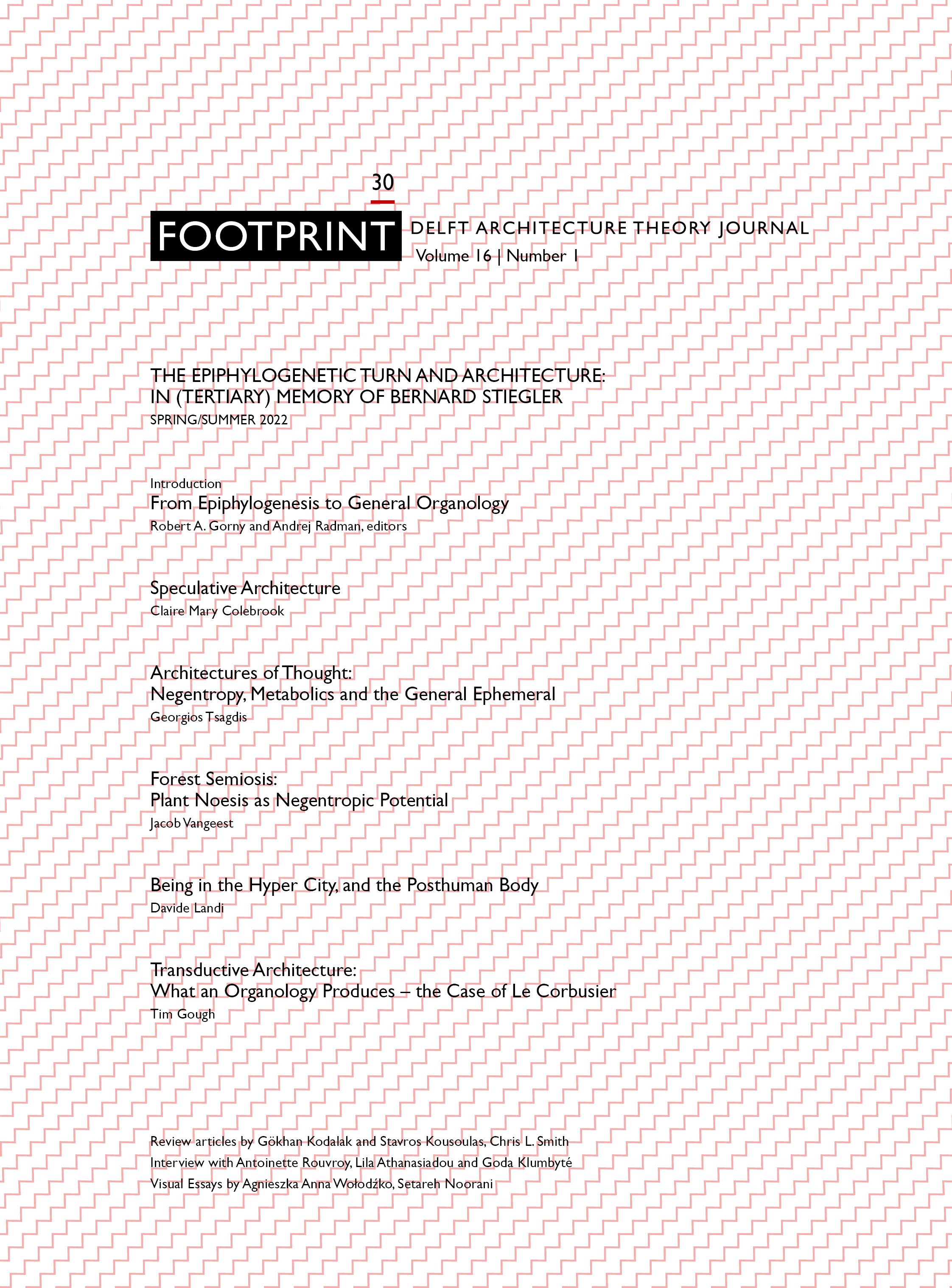Forethoughts and Afterthoughts on ‘the Productive Organs of Man’
DOI:
https://doi.org/10.7480/footprint.16.1.5852Abstract
This paper explores the ‘forethought’ of Bernard Stiegler’s Technics and Time, 1: The Fault of Epimetheus (1994). In particular, the paper focusses on the coupling of Karl Marx and Friedrich Engels and the impact of these figures on the relay of ideas concerning organs, organic matter and technology, or what Stiegler would come to call ‘organized inorganic matter’. The paper will also consider the ‘afterthought’ that derives from Stiegler’s book and its potential to prompt a rethinking of architectural experimentation and organization. The paper turns to Neil Spiller’s Communicating Vessels project and particularly to one joyous mechanism that came to be titled Little Soft Machinery (2006). The project enfolds all manner of architectural oddity, somewhere between the organic and inorganic.
References
Roy Bhaskar, Dialectic: The Pulse of Freedom (London: Verso, 1993).
Peter J. Bowler, The Eclipse of Darwinism: Anti-Darwinian Evolution Theories in the Decades around 1900, (Baltimore: The John Hopkins University Press, 1983).
Charles Darwin, On The Origin of Species By Means of Natural Selection, or the Preservation of Favoured Races In the Struggle for Life, (1859). Facsimile of the First Edition with an introduction by Ernst Mayr, (Cambridge Massachusetts: Harvard University Press, 1966).
Friedrich Engels, Dialectics of Nature (Moscow: Progress Publishers, 1986). Translated by Clemens Dutt.
Friedrich Engels, ‘Herr Eugen Dühring’s Revolution in Science’, in Karl Mark Frederick Engels Collected Works, (New York: International Publishers, 1976), vol. 25.
Sigmund Freud, Civilization and its Discontents, (London: Penguin Books, 2002), 28. Translation of Das Unbehagen in der Kultur (1930), by David McLintock.
Alfred Jarry, ‘The Crucifixion Considered as an Uphill Bicycle Race’, in The Selected Works of Alfred Jarry, (Grove Press, 1965). Translated by Roger Shattuck.
Karl Marx, Capital, Volume 1, (Harmondsworth, Eng: Penguin,1976). Translated by Ben Fowkes.
Flann O’Brien, The Third Policeman, (London: MacGibbon & Kee, 1967).
Plato, Protagoras (Project Gutenberg EBook, 2013). Translated by Benjamin Jowett.
Beatriz Preciado, Testo Junkie: Sex, Drugs, and Biopolitics in the Pharmacopornographic Era, (New York: The Feminist Press, 2013). Translated by Bruce Benderson.
Neil Spiller, ‘Ethics, Architecture and Little Soft Machinery’ in AD Architectural Design (vol 78. no 6. 2008): 94-97.
Neil Spiller, ‘Drawing as communicating vessels: an apologia (or not)’ in Drawing Futures - Speculations in Contemporary Drawing for Art and Architecture, (London: UCL Press, 2016): 142-8.
Bernard Stiegler, Technics and Time, 1: The Fault of Epimetheus, (Stanford: Stanford University Press, 1998). Translation of La techniques et le temps, 1: La faute d’Epiméthée, (Paris: Galilée, 1994) by Richard Beardsworth and George Collins.
Bernard Stiegler, ‘Elements for a General Organology’ in Derrida Today (13.1, 2020): 72-94.
Downloads
Published
Issue
Section
License
Copyright (c) 2022 Christopher Smith

This work is licensed under a Creative Commons Attribution 4.0 International License.
- Authors retain copyright and grant the journal right of first publication with the work simultaneously licensed under a Creative Commons Attribution License that allows others to share the work with an acknowledgement of the work's authorship and initial publication in this journal.
- Authors are able to enter into separate, additional contractual arrangements for the non-exclusive distribution of the journal's published version of the work (e.g., post it to an institutional repository or publish it in a book), with an acknowledgement of its initial publication in this journal.





